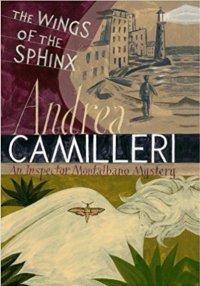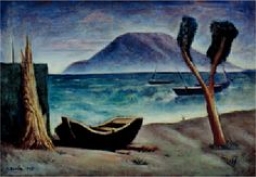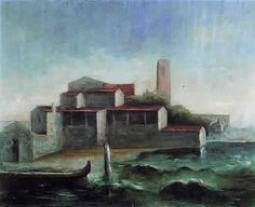|
"She must have been
very beautiful. A fantastic body," said the public prosecutor, his eyes
glistening with excitement.
Tommaseo, the
prosecutor, has intercepted Inspector Montalbano on the path. Notice how
Camilleri achieves two things at once with very few words: a sense of the
victim, a sense of the prosecutor. Other than a couple of other details -- she
has a tattoo of a four wing Sphinx moth and a considerable part of her face has
been blown off by a heavy bullet -- you really don't need to know anything else
about the crime scene.
Just concentrate on
Montalbano, who becomes your alter-ego:
'It used to be that
he felt afraid of dying people, while the dead made no impression on him.
Whereas now, and for the past few years he could no longer bear the sight of
people cut down in their youth.'
Montalbano is 56 here,
really on the skids. He's broken up with his girlfriend Livia and his police
station hasn't received its allotment of gasoline, so the cops are forced to
use their own cars, buy fuel on their own dime. It's a shitty situation, a
Berlusconi moment, an Italian cause de grace as the country crawls
through the mire of its own corruption, economic malfeasance, open borders,
senseless love, senseless death... auribus teneo lupum... untenable,
citizen.
And who's the
beautiful corpse? A Russian girl, another economic migrant, a 'dancer', a maid,
who certainly could be something else, for, who else ends up like a depraved
art exhibit in an illegal garbage dump if not involved in the sleazy world of
greedy sex and greedy money? So you're thinking. The only clue is the purpurin
resin beneath her fingernails, whatever purpurin is.
There's another case,
more amusing than anything, a fellow by the name of Picarella has gone missing,
kidnapped his wife asserts, even though no ransom demand has been received.
Then a guy with a gold chain and a Ferrari shows up at the Vigàta
station, tells Montalbano he saw Picarella dancing with a chick in a Havana
nightclub that weekend, shows him a photo. What does Montalbano hate the most?
Di Noto, the guy with the gold chain, or his Ferrari or the fact that now he
has to confront Picarella's wife, Ciccina, the rich vixen with connections in
the upper echelons, can make his life a misery with his boss the Commissioner
with the double-barrelled name, Bonetti-Alderighi? While Montalbano isn't
resentful towards the upper classes per se, he definitely doesn't like
playboys with gold chains and ostentatious cars, even if they're Italian cars.
Bear in mind that one of his good friends, Zito, the TV journalist, is a
communist. And when things aren't going well, it's easy to get pissed off like
a communist, export the pain.
Broadcast of the
sphinx tattoo draws witnesses. An old keyhole voyeur called Graceffa comes in
the station, tells Montalbano about the Russian maid he had for a month. Katya.
He wanted sex ("I'm still a man") but nothing doing. Then Montalbano's old
Swedish flame Ingrid shows up and reveals that she too had a Russian maid for a
month or two and she disappeared, taking 400,000 Euros in jewelry. Irina Ilych.
And she has the sphinx tattoo and was referred through a Catholic charity
called Benevolence, run by some priests and their friends, specialize in
providing foreign "home-care assistants". An arrogant cleric called Monsignor
Pisicchio runs the show; after a testy interview, Montalbano. 'smells a
rat'.
Montalbano goes home,
eats, sits down in front of the TV.
'...the television
had been presenting the same news story for years; the only things that changed
were the names....
'In Fela the
charred remains of a farmer previously convicted of collaborating with the
mafia were found in his car (the previous evening it had been the turn of an
accountant in Cuculiana, likewise a collaborator, to be charred).
'In the countryside
around Vibera the search for a mafioso on the run for seven years intensified
(the previous day the search for another mafioso, on the run for only five
years, had intensified in the countryside around Pozzolillo).
'In Roccabumera,
carabineri and criminals exchanged gunfire....'
I've shortened the
montage here, but you get the point. It's like the old newsreel roundup used to
condense the News for movie houses in the days before television, and used very
effectively at the beginning of Citizen Kane and Shangri La (the unreleased,
first version) (both assembled by Robert Wise, I believe). For Camilleri, the
montage is incantatory, almost a lament, but funny. The absurdity of it all is
like asking how many detectives does it take to fix a light bulb.
Montalbano retires to
bed with a novel -- 'proclaimed a masterpiece in the local paper' -- but ends
up throwing it against the wall. Once again it's the portrait of Montalbano the
man caught in the crossfire of modern life and death that carries the action,
because the imagery of serial crime and its culture in Montelusa province
remains much the same book to book in the series. The perpetual redundancy of a
job where law and (dis)order make a mockery of creative achievement is
demoralizing. The natives are incorrigibles. Sicilians, Italians, Euros... the
World.
So, half-way through
the story and still no gasoline... and a bunch of mouthy priests who use the
Old Boys network to put heat on Montalbano to cease and desist. Sergeant
Fazio's car is in worse shape than Columbo's. Fazio and Montalbano get stopped
in a carabinieri roadblock, fines being written and more humiliation until the
marshal recognizes Montalbano, waves them through. If it wasn't for the Carlo
Carrà paintings at a Notary's apartment they visit to see what they can
learn about his Russian maid, the day would've been another exasperating
experience.
'The landscape by
Tosi was superb, but when standing before Carrà's seascape, Montalbano
was moved almost to tears.'
This is interesting,
because, if you know that Carrà, like many of his Futurist colleagues,
was a supporter of Mussolini in the inter-war period, you might wonder how the
liberal egalitarian Inspector Montalbano could respond so positively to the
work of a fascist. Of course if you look at any of Carrà's seascapes,
you'd be hard pressed to see anything political in their faintly metaphysical
castings. Montalbano responds to beauty, which is feminine in his world view,
so when he pursues the killer of a woman, he's like an artist in search of a
subject.
Here, the priests are
in his way:
'How many
politicians with powerful connections in Rome, and all of them, whether of the
Right or the Left, with their wheels greased by priests, would take to the
field in defence of Monsignor Pisicchio and Benevolence?'
His boss phones from
Rome, tells him to step back, pass the case to the Flying Squad.
Montalbano
thinks:
'You eat, shit,
sleep, read a few novels, and every now and then you go to the movies. And
that's it. You don't like to travel, you don't go in for sports, you have no
hobbies, and when you come right down to it, you don't even have a few friends
with whom to spend a few hours....'
The self-pity doesn't
overcome the driving humour, that Camillerian sense of the absurd, where farce
and tragedy struggle for not only control of the News Channel but his own
self-worth. The decline in the status quo is both societal and personal. It's a
Zorba moment -- he can dance or go to sleep. He sleeps.
No, The Wings of the
Sphinx isn't the best novel in the series, yet it has some very good writing
and human insight along the way. It's almost scrubbed clean of romance, and the
shading of Montalbano's character shows him deteriorating almost to the edge of
despair. He's not really a detective, he's an artist, in the way that we're all
artists when frustration stands between us and beauty. And the death of romance
will do this every time. The dead girl in the dump isn't Livia, but it some
ways it is.
How does it end?
Better than you might think: tutte le strade condocono a Roma... all
roads lead to Rome.
© LR May
2017
*Check out LR's
OUTLAW
ACADEMIC »»
or LR's novel
RADIO
BRAZIL »»
|


